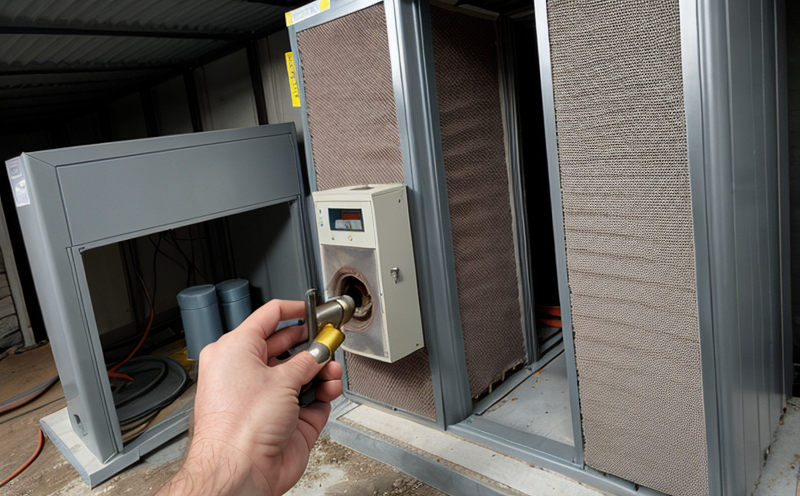Laboratory assessment of heat retention in curtain fabrics
When it comes to evaluating the thermal performance and insulative properties of curtain fabrics, laboratory testing plays a critical role. This service involves a comprehensive assessment of how well a curtain fabric retains heat within its environment, ensuring that materials meet or exceed specified standards for comfort, energy efficiency, and durability.
The process begins with careful selection of the specimen to be tested. Curtain fabrics must undergo precise preparation, including washing according to specific protocols outlined by relevant international standards such as ISO 13938-2:2005. The specimens are then conditioned in a controlled environment for a set period to ensure consistency.
The testing itself employs specialized equipment designed to simulate real-world conditions under which the curtain fabric will be used. This includes chambers that can control temperature, humidity, and airflow to replicate various environmental scenarios. Key parameters measured during this process include thermal resistance (R-value), heat transfer coefficient (U-value), and conductive properties.
Once data has been collected, it is analyzed according to established guidelines from organizations like ASTM E518-20 or EN ISO 9292:2007. These standards provide clear criteria for interpreting results so that manufacturers can ensure their products meet regulatory requirements and customer expectations. Reporting typically includes detailed graphs and charts illustrating performance metrics alongside recommendations for improvement where necessary.
By leveraging advanced laboratory techniques, this service not only enhances the quality of curtain fabrics but also contributes significantly to promoting sustainable practices within the industry by reducing energy consumption associated with heating and cooling processes in residential buildings.
International Acceptance and Recognition
The methodologies employed for laboratory assessment of heat retention in curtain fabrics have gained widespread acceptance across numerous countries around the world. Organizations such as ISO, ASTM, and EN have developed comprehensive standards that govern how these tests should be conducted.
For instance, ISO 13938-2:2005 specifies procedures for determining thermal resistance of building materials including curtain fabrics by means of guarded hot plate apparatuses. Similarly, ASTM E518-20 provides guidance on measuring heat transfer properties through steady-state methods using calorimetric equipment.
These internationally recognized standards guarantee that the results obtained from our laboratory assessments are valid and reliable, providing confidence not only to manufacturers but also to end-users who rely on accurate information when making purchasing decisions. The recognition afforded by these bodies ensures that businesses operating globally can trust in the consistency of their products regardless of location.
Environmental and Sustainability Contributions
The importance of testing curtain fabrics for heat retention cannot be overstated, especially given today's growing emphasis on environmental sustainability. By improving the insulative qualities of curtains, less energy is required to maintain desired temperatures inside homes and offices, thereby reducing greenhouse gas emissions associated with heating and cooling.
Testing contributes positively towards achieving LEED (Leadership in Energy & Environmental Design) certification for buildings, which encourages practices that reduce carbon footprints. Manufacturers who invest in rigorous testing not only enhance product performance but also demonstrate a commitment to environmental responsibility, appealing increasingly eco-conscious consumers.
In addition to direct benefits like reduced energy consumption and lower utility bills, there are broader impacts too. Less reliance on fossil fuels translates into cleaner air and healthier living spaces for occupants. Furthermore, sustainable practices adopted by textile industries can inspire similar actions throughout other sectors, fostering a culture of responsible resource management.
Use Cases and Application Examples
| Application Example | Description |
|---|---|
| Residential Window Coverings | Curtains made from highly insulative materials help maintain indoor temperature stability, enhancing comfort levels during both summer heatwaves and winter cold spells. |
| Commercial Office Spaces | Incorporating advanced thermal performance curtains into office environments can lead to significant savings on heating bills while improving overall working conditions for employees. |
| Sustainable Home Construction | Choosing curtain fabrics that excel in heat retention is just one part of a broader strategy aimed at constructing energy-efficient homes that minimize environmental impact. |
| Hospital and Care Facilities | Ensuring that patients are comfortable regardless of seasonal changes translates directly into better health outcomes, making this type of testing crucial for such facilities. |
The applications extend beyond just domestic settings; they encompass various commercial and institutional spaces where maintaining optimal thermal conditions is essential. From hospitals to schools, from hotels to retail stores, every place benefits from curtains that effectively retain heat, contributing to improved occupant comfort and reduced energy costs.





